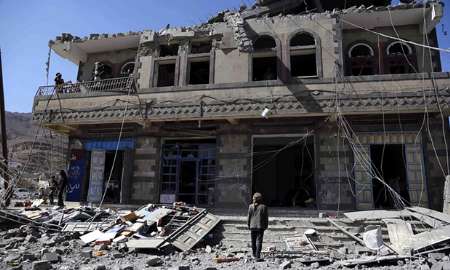The UK government has been put on notice that it is in breach of international law for allowing the export of British-made missiles and military equipment to Saudi Arabia that might have been used to kill civilians.
The hugely embarrassing accusation comes after human rights groups, the European parliament and the UN all expressed concerns about Saudi-led coalition attacks in Yemen, the UK Guardian reported on Saturday.
Lawyers acting for the UK-based Campaign Against the Arms Trade (CAAT) have stepped up legal proceedings against the Department for Business, Innovation and Skills, which approves export licenses, accusing it of failing in its legal duty to take steps to prevent and suppress violations of international humanitarian law.
In a 19-page legal letter seen by the Observer, CAAT warns that the government’s refusal to suspend current licenses to Saudi Arabia, and its decision “to continue the granting of new licenses” for military equipment that may be destined for use in Yemen, is unlawful.
The letter cites article two of the EU Council Common Position on arms sales, which would compel the UK to deny an export license if there was “a clear risk” that equipment might be used in a violation of international humanitarian law.
Lawyers for CAAT have given the government 14 days to suspend licenses allowing the export of military equipment to Saudi Arabia, pending the outcome of a review of its obligations under EU law and its own licensing criteria.
A failure to comply would see proceedings against the government, which would force it to explain in the high court what steps it has taken to ensure that UK military hardware is not being used in breach of international law.
“UK weapons have been central to a bombing campaign that has killed thousands of people, destroyed vital infrastructure and inflamed tensions in the region,” said Andrew Smith of CAAT. “The UK has been complicit in the destruction by continuing to support airstrikes and provide arms, despite strong and increasing evidence that war crimes are being committed.”
The legal move places the UK’s relationship with Saudi Arabia in the spotlight at a sensitive time.
Almost £6bn of UK arms have been licensed to Saudi Arabia since David Cameron took office. However, concerns about the country’s human rights record have led to calls for the UK to stop arming the Saudis.
Last weekend, Saudi authorities staged a mass execution of 47 prisoners; including prominent cleric Sheikh Nimr al-Nimr.
Sheikh Nimr was known for his sermons criticizing the kingdom’s government and for his support of political protests in the country’s oil-rich Eastern Province.
In the wake of the executions, Belgium announced it would ban arms sales to Saudi Arabia.
Germany’s Greens have demanded their country do the same.
IRNA
R.S

